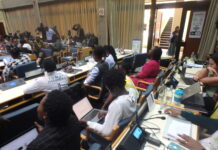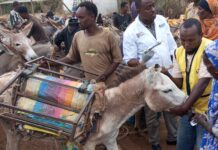By Elisabetta Demartis and Sandro Bozzolo
Cheptais is a village in Kenya’s Western Province , in a borderland with few connections to the region’s main cities. Uganda is just beyond the mountains, only twelve kilometers away, and the villagers periodically travel there on foot to buy seeds – they cost less in Uganda.
But buying seeds is not the only challenge for local farmers here– especially for women.
In the past few decades, the communities in this area have seen a rise in HIV infection rates, and paramilitary violence began in 2005. The Sabaot Land Defence Force (SLDF), a guerilla group that is most active in the district of Mount Elgon, has dragged over 600 people into a fratricidal war in the region. The majority of these people are villagers and small-scale farmers. “Our young people have been decimated by this war,” says Helen M. Makoe, a small-scale farmer from Cheptais who was widowed by the armed rebels’ violence. The collateral effects of the war’s violence don’t end with the many men who have died: the women who lost their husbands have also been marginalized by the community. “The other women look at us with suspicion and hostility if we try to participate actively in collective projects,” Makoe says. “They think we do it to get close to their husbands and steal them away.”
In this complicated situation in which women are forced to live, agriculture is yet another obstacle that prevents them from achieving autonomy and reclaiming dignity.

“Every day we go to work in the fields with our children,” says Makoe, “but at the time of the harvest, the husbands who have survived the war take everything and leave, and when they come back, there is no money left until the next season.” But programs developed by the Anglican Development Service (ADS) offer local women some hope. ADS is an NGO supported by the Anglican Church, and thanks to a young local program coordinator, they recently decided to implement programming dedicated to empowering Cheptais’s small-scale farmers. Through this programming, they hope to reconstruct the community from the ground up. “Our project sets up ICT lessons,” explains Gerishom Boiyo, coordinator of ADS’s ICT programs. “Through these lessons, small-scale farmers learn to use instruments like their cell phones, computers, and video-cameras to access information and find alternative ways to sell their products,”
Accessing data on market prices? SMS makes it possible
The two mobile services that have produced the most concrete results for their new users in Cheptais are M-Farm and Frontline SMS. M-Farm is a Kenyan web and SMS-based application that periodically sends farmers the prices of goods on the market, allowing them to communicate directly with consumers and reducing the power of the middlemen. These middlemen often take advantage of rural farmers’ ignorance on the market prices of their products. They purchase local fruit and vegetables at very low prices and re-sell them at high prices, profiting on their sale to the disadvantage of the producers. “Through the M-Farm application,” the small-scale female farmers realized that the middlemen were exploiting them and they understood the potentials that digital services could offer them,” explains Lydia Wekessa, co-director of ADS’s ICT program.

Frontline SMS is an open-source software used to collect and distribute information via SMS, without an internet connection. Thanks to this service, ADS has established a partnership with Kenya’s Ministry of Agriculture to create an avenue for direct communication between rural farmers and experts. “The service works like this,” explains Boiyo. “A farmer who has a problem texts a message to a predetermined number. All of these questions are collected and forwarded to experts in the Ministry of Agriculture, who visit the village once a week to hold discussions with our farmers and to respond to the questions they sent via SMS.”
Especially for farmers who live in rural zones and villages far away from urban centers, these ICT-based services offer farmers the possibility to access information that is often monopolized by intermediaries. With access to this information, farmers realize the enormous potential of selling one’s own products directly on the market.
Digital Technology and Women Empowerment
In Cheptais, these dynamics are particularly powerful and influential for women, who make up the large majority of the farmers.Furthermore, women’s lives are made more difficult by the fact that traditionally, men were the only ones with the power to make decisions about their family’s economic well-being.
Anthropologist Kenneth Bundi Mbaya, who has followed this program closely, says that in additional to battling the chronic problems of their work in the field, such as the high cost of seeds, the strenuous harvest, and the arbitrary contracts established by traders and middlemen, “this mechanism of role distribution expects that the women will work in the fields while the men manage the harvest and the seeding.” But men often appear at the moment of the harvest, only to disappear with the profits, negatively impacting the fulfillment of the women’s role within the family and in her community. ICTs have ruptured this dynamic, allowing women to recognize the problems they face as community issues, and to attempt to resolve them using mobile technology.

“Today we can communicate the availability of our products with our cell phones,” says Rose Kapchanga, another farmer from Cheptais. “The traders who are interested will come to get them from the harvest centers that we women have created.
This way, we receive the money directly from their hands, and we can put it aside to save for small investments, and to pay for school fees for our children, without our husbands unfairly taking all the money.” Women in the village have enthusiastically embraced the use of mobile technology in agriculture. Through mobile technology, they have established a strong contact with the world beyond their village, breaking the isolation and solitude that had been immutable for decades.
Cheptais’ example shows how ICTs can become an instrument of empowerment for women farmers, allowing them to follow the cycle of production from purchasing seeds to the sale of their products. They thereby attack the foundations of a consolidated model of family management that had relegated women to producing agricultural products while their husbands reaped the profits.
“Men try to stop their wives from participating in our courses,” says Boiyo,” because they think that our activities interfere with the work that women have to do at home. To address this problem, we introduced different hours, so women could participate whenever it was convenient for them.”
Digital technology has thus upended the traditional role of the breadwinner, making men’s involvement in the agricultural profession superfluous. The staff of ADS has faced many challenges because of this. But ADS has found other creative ways to meet their objectives: by offering ICT courses for youth in the village, children learn how to use ICTs and teach their mothers what they’ve learned.
The battle that rages along the arid hills of Cheptais is thus not only fought merely over agricultural terrain, but has also expanded into questions of gender and women’s autonomy. Whatever the consequences are, it’s clear that in Cheptais, nothing will be as it was before. For the women of Cheptais, technological innovation has become a means to achieve independence and self-determination.
This reporting is a part of the Agritools project, which is supported by the European Journalism Centre and funded by the Bill and Melinda Gates Foundation.















